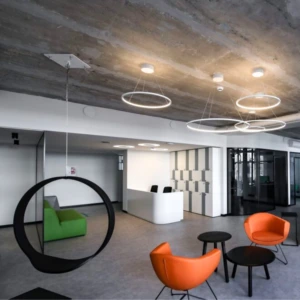The programme is only conducted in Lithuanian language. Entry requirements for this particular programme can be found in the programme description provided in Lithuanian language.
in Lithuanian
Take command of the digital world
Today’s software systems control everything from smartphones to business solutions, and their creators are becoming the architects of the future. Programming in a wide range of modern languages, you’ll learn how to create secure and efficient solutions using advanced Agile methodologies and UML design. Working on real business projects, graduates become versatile developers, able to build mobile applications as well as complex systems. Upon graduation, you can expect some of the highest salaries in the market and a wide range of career opportunities.

The Investors’ Forum Association and the Invest Lithuania Agency have awarded the programme with the Investors’ Spotlight Quality Label. It has been recognised for its excellent relevance to market needs and professionally developed study curriculum. Graduates of the study programme have been employed by industry leaders.

The studies involve working on real projects individually and in teams, the topics for which can also be provided by businesses. Some of them are turned into demonstration projects, showcased at exhibitions such as Technorama, presented as proof of competencies acquired in the workplace, or even as a source of income.

Students’ final projects address real-world problems, and some of them become products for use in business or start-up projects.

The study content can be adapted to individual needs by choosing between several study modules. There is also the possibility to choose interdisciplinary BA+ competencies.
This programme is designed for future software system developers whose careers will focus on creating software of varying purposes and complexity through design, programming, testing, and deployment.
You will gain skills in multiple programming languages and learn to use a range of design environments and development tools to create secure, efficient software that meets customer requirements. Additionally, you will develop teamwork skills by collaborating on real software development projects.
All of this is designed to help you progress smoothly and confidently in your career:
Specifies the requirements, designs the architecture, develops, programs and tests the software to be developed, ensuring that it is safe and efficient.
Specifies the functionality, designs, programs and tests a solution requiring software development, ensuring its safe and efficient operation.
Analyses software requirements to address real-world problems, evaluates potential implementation technologies and tools, and plans and executes software development projects.
| Module name | Credits | Method of organisation |
|---|
| Computer Graphics | 6 | On-campus learning |
| Introduction to Studies of Informatics | 9 | On-campus learning |
| Mathematics 1 | 6 | On-campus learning |
| Object-Oriented Programming 1 | 9 | On-campus learning |
| Module name | Credits | Method of organisation |
|---|
| Mathematics 2 | 6 | On-campus learning |
| Object-Oriented Programming 2 | 6 | On-campus learning |
| Physics 1 | 6 | On-campus learning |
| The First Principles of Digital Logic | 6 | On-campus learning |
| Media Philosophy | 6 | Blended learning |
| Sustainable Development | 6 | On-campus learning |
| Module name | Credits | Method of organisation |
|---|
| Academic and Technical Communication in English (Level C1) | 6 | On-campus learning |
| Computer Architecture | 6 | On-campus learning |
| Data Structures | 6 | On-campus learning |
| Discrete Structures | 6 | On-campus learning |
| Theory of Probability and Statistics | 6 | On-campus learning |
| Module name | Credits | Method of organisation |
|---|
| Databases | 6 | On-campus learning |
| Design and Analysis of Computer Algorithms | 6 | On-campus learning |
| Operating Systems | 6 | On-campus learning |
| Software System Engineering | 6 | On-campus learning |
| Software Systems Testing | 6 | On-campus learning |
| Module name | Credits | Method of organisation |
|---|
| Computer Networks and Internet Technologies | 6 | On-campus learning |
| Concurrent Programming | 6 | On-campus learning |
| Fundamentals of Information Systems | 6 | On-campus learning |
| Numerical Methods and Algorithms | 6 | Blended learning |
| Competence Subjects of BA+ | 6 |
| Basics of Accounting | 6 | On-campus learning |
| Fundamentals of Electronics | 6 | On-campus learning |
| Machine Learning Methods | 6 | On-campus learning |
| Innovation Management | 6 | On-campus learning |
| Algebraic Structures | 6 | On-campus learning |
| Data Analysis | 6 | On-campus learning |
| Design Fundamentals | 6 | On-campus learning |
| Fundamentals of Digital Marketing | 6 | On-campus learning |
| Investment Mathematics | 6 | On-campus learning |
| Fundamentals of Enterprises Accounting and Financial Management | 6 | On-campus learning |
| French Language (level A1) | 6 | On-campus learning |
| French Language (level A2) | 6 | On-campus learning |
| French Language (level B1) | 6 | On-campus learning |
| German Language (level A1) | 6 | On-campus learning |
| German Language (level A2) | 6 | On-campus learning |
| German Language (level B1) | 6 | On-campus learning |
| Russian Language (level A1) | 6 | On-campus learning |
| Russian Language (level A2) | 6 | On-campus learning |
| Russian Language (level B1) | 6 | On-campus learning |
| Spanish Language (level A1) | 6 | On-campus learning |
| Spanish Language (level A2) | 6 | On-campus learning |
| Spanish Language (level B1) | 6 | On-campus learning |
| Fundamentals of 3D Modelling | 6 | On-campus learning |
| Design of Analog Integrated Circuits | 6 | On-campus learning |
| Fundamentals of Cognitive Neuroscience | 6 | Blended learning |
| Business Intelligence and Data Mining | 6 | On-campus learning |
| Scripting Languages | 6 | On-campus learning |
| Introduction to Public Governance | 6 | Blended learning |
| Analysis and Translation of Technical Text 2 (English) | 6 | On-campus learning |
| Optional Subjects 2026 | 6 |
| Module name | Credits | Method of organisation |
|---|
| Product Development Project | 12 | On-campus learning |
| Software Systems Analysis and Design Tools | 6 | On-campus learning |
| Introduction to Artificial Intelligence | 6 | On-campus learning |
| Optimization Methods | 6 | On-campus learning |
| Competence Subjects of BA+ | 6 |
| Taxes and Taxation | 6 | On-campus learning |
| Introduction to Practical Electronics | 3 | On-campus learning |
| Modern Electronic Technology | 3 | On-campus learning |
| Neural Network Methods | 6 | On-campus learning |
| Sales Management | 6 | On-campus learning |
| Cryptology | 6 | On-campus learning |
| Business Intelligence and Data Mining | 6 | On-campus learning |
| User Experience Design | 6 | On-campus learning |
| Search Engine Advertising | 6 | Blended learning |
| Social Media Marketing | 6 | On-campus learning |
| Methodology of Risk Analysis in Business | 6 | On-campus learning |
| Personal Finance Management | 6 | On-campus learning |
| French Language (level A2) | 6 | On-campus learning |
| French Language (level B1) | 6 | On-campus learning |
| French Language (level B2) | 6 | On-campus learning |
| German Language (level A2) | 6 | On-campus learning |
| German Language (level B1) | 6 | On-campus learning |
| German Language (level B2) | 6 | On-campus learning |
| Russian Language (level A2) | 6 | On-campus learning |
| Russian Language (level B1) | 6 | On-campus learning |
| Russian Language (level B2) | 6 | On-campus learning |
| Spanish Language (level A2) | 6 | On-campus learning |
| Spanish Language (level B1) | 6 | On-campus learning |
| Spanish Language (level B2) | 6 | On-campus learning |
| Fundamentals of Computer Game Development | 6 | On-campus learning |
| Chip Prototyping, Manufacturing and Testing Technologies | 6 | On-campus learning |
| General Neuropsychology | 6 | Blended learning |
| Database Development and Administration | 6 | On-campus learning |
| Programming Services in Cloud Computing | 6 | On-campus learning |
| Ethics and Corruption Prevention in Public Sector | 6 | Blended learning |
| Translation Technologies and Artificial Intelligence | 6 | On-campus learning |
| Optional Subjects 2026 | 6 |
| Module name | Credits | Method of organisation |
|---|
| Object-Oriented Programme Design | 6 | On-campus learning |
| Theory of Programming Languages | 6 | On-campus learning |
| Engineering Economics | 6 | On-campus learning |
| Sustainable Human Development | 6 | On-campus learning |
| Human-Computer Interface Design | 6 | Blended learning |
| Robot Programming Technologies | 6 | On-campus learning |
| Web Application Design | 6 | On-campus learning |
| Competence Subjects of BA+ | 6 |
| Business Analysis and Valuation | 6 | On-campus learning |
| Computer Communications | 6 | On-campus learning |
| Artificial Intelligence Solutions Development | 6 | On-campus learning |
| Negotiation | 6 | Blended learning |
| Data Security | 6 | On-campus learning |
| Machine Learning Methods | 6 | On-campus learning |
| Sketching fundamentals | 6 | On-campus learning |
| Brand Management | 6 | On-campus learning |
| Insurance Mathematics | 6 | On-campus learning |
| Financial Markets and Institutions | 6 | On-campus learning |
| French Language (level B1) | 6 | On-campus learning |
| French Language (level B2) | 6 | On-campus learning |
| French Language (level C1) | 6 | On-campus learning |
| German Language (level B1) | 6 | On-campus learning |
| German Language (level B2) | 6 | On-campus learning |
| German Language (Level C1) | 6 | On-campus learning |
| Russian Language (level B1) | 6 | On-campus learning |
| Russian Language (level B2) | 6 | On-campus learning |
| Russian Language (Level C1) | 6 | On-campus learning |
| Spanish Language (level B1) | 6 | On-campus learning |
| Spanish Language (level B2) | 6 | On-campus learning |
| Spanish Language (level C1) | 6 | On-campus learning |
| Virtual Reality Technologies | 6 | On-campus learning |
| Chip Manufacturing Technologies | 6 | On-campus learning |
| Basics of Neuroscience Engineering | 6 | On-campus learning |
| Debugging of Information Systems Software | 3 | On-campus learning |
| Distributed Databases | 3 | On-campus learning |
| Computer Network and Internet Security | 6 | On-campus learning |
| Theories of Public Governance Organisations | 6 | Blended learning |
| Analysis and Translation of Technical Text 4 (English) | 6 | On-campus learning |
| Optional Subjects 2026 | 6 |
| Module name | Credits | Method of organisation |
|---|
| Bachelor’s Degree Final Project | 15 | On-campus learning |
| Professional Internship | 15 | Blended learning |
The programme is only conducted in Lithuanian language. Entry requirements for this particular programme can be found in the programme description provided in Lithuanian language.
in Lithuanian

KTU provides a comprehensive education, both academically and personally. Here, we gain the knowledge needed to become professionals in the field of software systems development, while also building character through the pursuit of learning. What impresses me most is the wide scope of knowledge offered – the variety of modules allows you to explore different areas of programming and discover the ones that interest you most.
The KTU Software Systems study programme allowed me to discover myself as a programmer and to reach career heights, taking advantage of the lecturers’ long-term experience and the opportunity to cooperate with companies. The studies cover the essential fundamentals of programming, which builds a solid foundation for a future career and allows me to consistently learn and understand what kind of programmer I can be in the future.

Software professionals are in high demand in information technology companies. We are also constantly looking for programmers, product designers and systems engineers to join our teams. KTU Software Systems graduates enter companies with a solid foundation of practical and theoretical knowledge. They know various programming languages, work with cloud technologies and use management tools effectively.

Talk to us, study with us:
K. Donelaičio St. 73, LT-44249 Kaunas
phone +370 679 44 555
email studijos@ktu.lt
Faculty of Informatics
XI Chamber
Studentų St. 50, LT-51368 Kaunas
email if@ktu.lt
 virtual tour
virtual tour